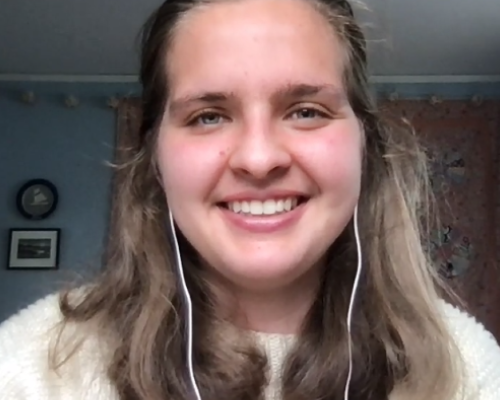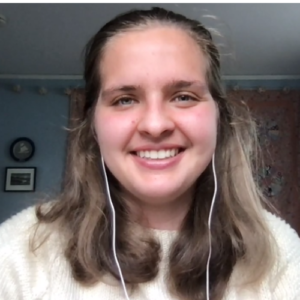
Julie Self: a Vision Scientist Helping Students Envision Themselves in Science
April 2021
 Julie Self is a second year Vision Science PhD student with a background in neuroscience. This spring, she was selected as an Inspiration Honoree for the 200,000 Students Inspired Celebration in May 2021.
Julie Self is a second year Vision Science PhD student with a background in neuroscience. This spring, she was selected as an Inspiration Honoree for the 200,000 Students Inspired Celebration in May 2021.
How did you become involved with CRS?
One of the members of our program started a lesson Eye See It to teach students about the eye. As a first year, I thought that was a really cool opportunity to interact with young students. Then, she was looking to step down from the role and asked me and another colleague if we would be interested in taking that on. We’ve been in charge of the Vision Science lesson plan for the past year.
What led you to your field of study?
The cheesy answer is I was sitting in my junior year history classroom and I had the realization that any point in history that hasn’t been influenced by a natural disaster has been influenced by the decision people have made as a result of the chemicals floating around in their brain. That pairing with an IB Biology course was the “Yea, Science is cool, and I have a way of studying it.”
The vision piece is serendipitous; my senior year of undergraduate, we had a new professor who was doing computational neuroscience, and her research just happened to be in vision. My undergrad thesis was looking at vision and I enjoyed the experience, so I’ve continued to study it.
Who or what has inspired you in your academic career?
I had a very unique middle school experience at a hippie, crunchy granola school. There was a huge focus on self-engaged creativity and self-engaged learning often expressed by building bridges across mud puddles and seeing what the best structure was– a lot of self-guided play and encouragement from teachers. I think the core curiosity, question-asking and knowledge for knowledge’s sake came from my middle school experience. But mainly, it’s been my teachers, I all the way through high school and college I’ve just lucked out in the quality of teaching around me, very kind people who are engaged, passionate, and excited to have you be passionate as well.
Click to hear about Julie’s inspiration in her own words.
Who do you hope to inspire in your work?
I think the moment that kids see themselves as people that ask questions and think creatively is immensely important. Especially with what the perception has been of who can be a scientist, I think in terms of fuddy duddy old white guy in a lab coat, I think it’s particularly important to show students that haven’t had that representation that they are also awesome scientists.
What brings you a sense of wonder in your work?
Science does a lot of the heavy lifting for that on its own. The stuff we’re able to do is so inherently cool. The [research] I’m involved in uses behavioral response, FMRI– a way of looking at the neural response in our brain– The pieces of that are so intrinsically cool. I’ve gotten to look at pictures of what’s inside my head. We have ways of saying If I showed you a stimulus and then I look at your brain pattern, can I predict what you saw? And can I reconstruct what you were looking at? And we can do that! And that’s just mindblowing!
Making sure that what you’re bringing in is accessible to a level that the kids can engage with. Having two or three main points that you want them to take away from the lesson and give them a buffet of examples of how they could get there, and then let them choose which one is the coolest.
The ultimate success would be if a student leaves with some new fact in their mind or some new question that they could go and share with their family and friends.
Describe a discovery you’ve made.
I don’t think science always works that way. A lot of science is building blocks and making small little steps based on what other people have done. Even if you’re not the one who makes some huge discovery, you’ve added some piece that’s going to get someone to ask a question that’s going to get to that big discovery.
Click to hear about Julie’s discovery in her own words.
Describe a goal you are working towards.
My current research looks at natural scenes. Basically, when we look at pictures of the real world, how do we process those and how do we know what we’re looking at. That has a lot of broader applications for understanding our everyday experience. It’s the fundamental question of What can we know? And How can we know what we don’t know?
Click to hear about Julie’s goal in her own words.